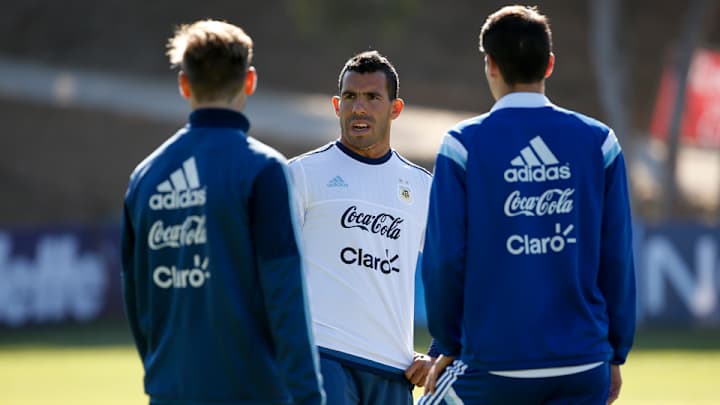Polarizing yet popular, Carlos Tevez impacts Argentina at Copa America

It didn’t take long after his return to the Argentina squad for Carlos Tevez to start drawing the wrong sort of attention again. He is a player stalked perpetually by controversy, particularly when he wears the national shirt. For almost four years the Juventus striker had been exiled from the national team, dismissed as a troublesome presence incapable of playing in the same side as Lionel Messi—frustratingly, given how well they played together at the 2007 Copa America.
For all his fine form for Juventus, his return was a risk. After what happened in La Serena on Saturday, it may be one the Argentina coach Gerardo Martino is regretting.
Tuesday’s game against Uruguay, the Rioplatense derby, was always going to be tense. After Argentina threw away a two-goal lead to draw against Paraguay it may also have a significant bearing on the group. Whichever team finishes second will face a quarterfinal against the side that finishes top in Group C–which after Sunday’s results now looks like being Brazil. Finishing top means a game against a third-placed side. The punishment for Argentina’s slip-up could be severe.
Paraguay's stunning rally adds more pressure on Lionel Messi, Argentina
For 55 minutes against Paraguay, everything was going perfectly for Argentina. It was playing with verve and intelligence and led 2-0; the only criticism would be that it had been a little wasteful in front of goal, a little lacking in edge. Even when Nelson Haedo capitalized on some defensive laxity and strange positioning from the goalkeeper Sergio Romero to lash in a goal for Paraguay, it seemed little more than a blip. But then Argentina panicked.
Rather than closing the play down and asserting its authority, it let the game become more ragged. There were chances at both ends and then came the substitutions: Martino, to widespread disbelief, brought on Tevez and Gonzalo Higuain.
Martino later claimed his intention was to try to score a third goal and finish the game, but that was a mystifying explanation. Argentina was already creating chances; its issue was that it wasn’t able to check the flow of Paraguayan chances. Shuffling Angel Di Maria back into midfield was never likely to change that. Which raises the suspicion that Higuain and Tevez were brought on for political reasons: both to appease them and their supporters among the media.
• STRAUS: Renewed vigor surrounds U.S. after big victories
And that is part of the problem of Tevez. He is popular, destabilizingly so. He wouldn’t even have made the 2011 Copa America but for a public outcry and the intervention of the governor of Buenos Aires, Daniel Scioli. Coach Sergio Batista has since said he wouldn’t have selected Tevez but for “political pressure.”
Arturo Vidal, Chile storm back to force draw with Mexico in Copa America
The decision to pick him was initially greeted with glee. Tevez, short and stocky and with his shock of black hair, was the model of the pibe, the archetype of Argentinian football as set down by Borocoto, the editor of El Grafico, in 1929.
Tevez had made his name with Boca Juniors (unlike Messi, who went to Barcelona when he was 13). He had friends in the media.
Early in that Copa America, there was no question that fans cheered his name louder than that of Messi when the lineups were read out before kickoff—Messi, as the stadium announcer in Santa Fe said, was “el mejor del mundo” (the best in the world), but Tevez was “el jugador del pueblo” (the player of the people). It soon became apparent, though, that Messi and Tevez were getting in each other’s way, making the same runs. Tevez was left out, and, after making a petulant substitute appearance in the quarterfinal that culminated with him missing a penalty in the shootout as Argentina lost to Uruguay, public opinion turned against him.
Governor Scioli was at it again before the World Cup, describing Tevez as “a great motivator, with great spirit,” but the coach Alejandro Sabella, who had taken advantage of Tevez’s exile from Manchester City in the middle of the 2011-12 season not to recall him, refused to countenance his return. After all, it’s not as though Argentina is short of attacking talent.
Martino, though, brought him back for the friendly against El Salvador in March. The theory was that now, with Messi so obviously the key figure, Tevez would accept his back-up role, that he would not be the difficult, sulky presence he has been in the past. But Tevez is one of those figures who seems to cause trouble even when on his best behavior.
• LYTTLETON: Who is likely to be on the move this transfer window?
The Argentinian sports paper Ole has been notably supportive, a feature last week describing Tevez as thinner, stronger and more mature than in 2011, while even after the Paraguay draw it detailed how he had scored three goals in training. But that, in a sense, is the difficulty. Newspapers wouldn’t produce that sort of analysis for anybody else and, even if it’s indirect, the subtext is clear: Tevez is there, ready and available, to be a savior, to force himself into the side as he did in the Copas of 2004 and 2007.
And that, in turn, especially in a team that is stuttering, can undermine morale. That it’s even being considered that Martino might have made a substitution with the thought of what the media may say in mind is evidence of that.

An accomplished author of multiple books, Jonathan Wilson is one of the world’s preeminent minds on soccer tactics and history.